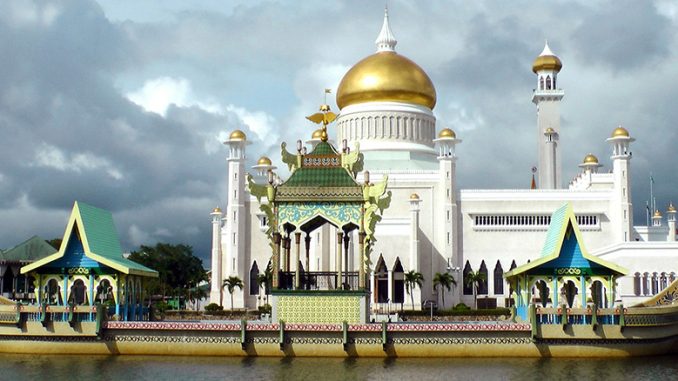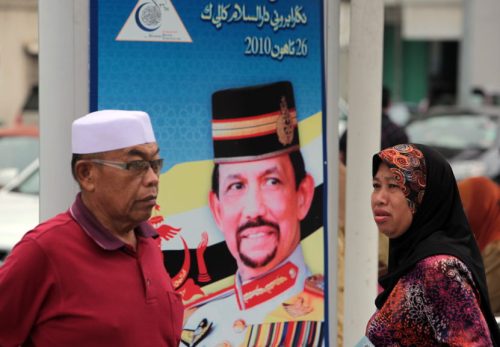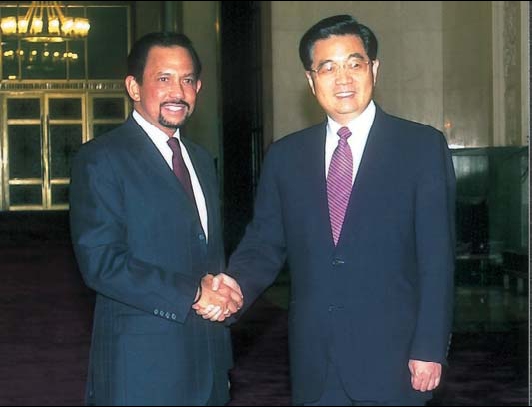
To a regionally unparalleled extent, political Islamization 1 in Brunei Darussalam is the exclusive domain of the state. Brunei’s religious bureaucracy maintains an absolute monopoly over Islam-related public communication. No organized secularist or Islamist opposition group has ever openly challenged the post-colonial government’s religious stance. Islamic policy-making takes place solely among state actors, and behind closed doors. Non-state Islamic organizations, independent religious scholars (ulama), or “uncontrolled” Islamic publications, are publicly non-existent. Bruneian ulama are, by definition, civil servants.
In the declaration of Independence in 1984, Sultan Hassanal Bolkiah proclaimed that Brunei “shall be forever a sovereign, democratic and independent Malay, Muslim Monarchy upon the teachings of (Sunni) Islam”. 2 He considers Brunei a “non-secular” state. The notion of being “democratic” is debatable, as Brunei never had general elections, has no parliament, no organized opposition, and is governed by a cabinet appointed by the Sultan. He holds full executive powers, constitutionally “can do no wrong” (Article 84B), and is Prime Minister, Minister of Defense, of Finance, of Foreign Affairs and Trade, commander of the police and army, “head of the official religion” (Article 3(2)), i.e. Islam, and considered “Allah’s vice-regent on earth” (khalifah), and the “leader of believers” (ulil amri).
In 2004, a Legislative Council (LegCo) was re-established after its predecessor was dissolved in 1983. Some view it as “window dressing”, considering its largely appointed character and lack of powers. Others see it as a controlled step towards a new political culture of public participation. No such culture has existed since a short-lived rebellion in 1962, followed by decades of emergency rule. Members of the public can now bring up concerns to LegCo delegates, who assemble annually. The Council also “approves” government budgets.
Brunei’s official national ideology, “Malay Islamic Monarchy” (Melayu Islam Beraja, MIB), is of utmost political importance. It privileges Malay ethnicity (M), Islam (I), and the monarchy (B) as the core of national identity. In response to criticisms that MIB is “invented tradition”, Bruneian scholars – who are obliged to promote MIB – acknowledge the acronym’s invention but insist that it reflects the essence of centuries-old “Bruneian culture” (Mohd Zain 1996:45; Müller 2015:315).
MIB has been increasingly institutionalized. An MIB Concept Committee began its work in 1986 and was later transformed into the MIB Supreme Council. In 1990, the government established the Academy of Brunei Studies (APB), based at University of Brunei Darussalam, which hosts the MIB Supreme Council’s secretariat. The APB is the key force for MIB-knowledge production. It propagates MIB at three levels: schools, higher education, and the public. MIB classes in schools, colleges and universities are obligatory; no citizen can graduate without passing the MIB modules. News media constantly refer to MIB, and public events are typically framed as serving MIB. Art or poetry competitions, for example, follow MIB-patriotic terms, and students abroad are instructed to “uphold the values of MIB”. 3 The centrality of MIB to good citizenship and the norms of public expression has been deeply internalized in society and whatever opinions individuals have about MIB remains concealed in “hidden transcripts” (Scott 1990). Even MIB officers, however, share everyday jokes reinventing the acronym’s meaning. More serious questionings of the concept occur on cyberspace (Müller 2010:157), albeit very rarely.
Legal and Institutional Means of MIB-Islamic Governance
Brunei’s history of Islamization policies is a history of cementing the state’s monopoly to define the contents and red lines of Islamic doctrine and practice. Organized “Islamist mobilization” – this special issue’s theme – rarely exists, at least not in oppositional or non-state contexts, although individuals with sympathies for foreign militias (e.g. Jamaah Islamiyah) and members of non-violent but illegal Muslim groups (e.g. the Malaysian al-Arqam) have been arrested in the past. If “Islamism” refers to a political ideology and social project aspiring to utilize the state and its legal apparatus for a top-down Islamization of society, alongside educational efforts, the Bruneian state itself has been passionately engaging in “Islamist” mobilization since the 1980s.
Historically, an Islamically inspired legal code existed in pre-colonial Brunei, alongside customary normativities. During the British residency (1906–1959, protectorate since 1888), colonial officers advised the sultans on “modernizing” religious administration, aiming at a systematic institutionalization and codification following British understandings of state-building and legalistic thinking. This resulted in a series of legal codes, beginning with the Mohammedan Laws Enactment of 1912, and the establishment of new institutions. Notwithstanding this diversification, the Islamic legal sphere became limited to family and personal status law, although some religiously defined criminal offenses were punishable as well. The Sultans’ powers became reduced to religious and customary matters, but they used these spheres to consolidate their position and symbolic power. In 1959, Brunei became largely autonomous in domestic affairs. The Constitution of 1959 emphasized the nation’s “Islamic” and “Malay” character. It does not address individual rights, except for religious “practice … in peace and harmony” (Article 3).

The colonial foundations of religious administration, somewhat paradoxically, provided the “institutional language” for emancipatory post-colonial Islamization policies. These included new Islamic laws and a further expansion of the religious bureaucracy’s influence and functional differentiation. In 1990, a working group began reviewing existing laws to bring them “in line with Islam” (Müller 2015:321). This aimed at British-derived laws which exist parallel to Syariah Law in a dual system. In 1991 and 1992, the sale of alcohol and pork were banned. The bureaucracy became increasingly concerned with outlawing what it (particularly the State Mufti) considered “deviations” from “true Islam”, beginning with the banning of the Bahai (Müller 2015:328), followed by a growing list of “deviant teachings”. Parallel to ensuring that no non-state Islamic discursive space can exist, the bureaucracy aimed to “purify” Muslim-Malay culture from “superstitious” elements (Müller 2015:327ff.). Defining and countering any such “deviance” is a central bureaucratic activity, alongside social and charitable work, propagation, mosque building and maintenance, the authoring of Friday prayer sermons, and pilgrimage affairs. Influential institutions include the State Mufti Department, Ministry of Religious Affairs, Islamic Da’wah Centre, and the Aqidah (Doctrine) Control Section. The Religious Council (MUIB) is the “chief authority” in Islamic matters below the Sultan, whom it advises. Its Legal Committee is headed by the Mufti. The Council’s “rulings” (a term used synonymously in Brunei’s English-language laws with fatwa) are “binding on all (Shafi’i) Muslims … residing in Brunei” once the Sultan or MUIB order their publication in the Gazette. State-Islam follows the Sunni Shafi’i school, which Bruneian Muslims are expected to follow.
The bureaucracy aims to implement the Islamic principle of “commanding what is right and forbidding what is wrong”. The Aqidah Control Section, for example, justifies its work citing this principle. Its predecessor organization was established in 1986 following a “possession” case, assumedly caused by sorcery or spirit consultation (Müller 2015:328). Its powers gradually increased. It maintains subunits targeting specifically classified sub-fields of “deviance”, alongside administration, operations and surveillance. It encourages civic involvement, has 24-hour telephone hotlines, and maintains a network of informants, two of whom the author interviewed in 2017. Another tool for cementing state power in the Islamic field are fatwas, which only the State Mufti can produce. Issuing “unlawful fatwas” is punishable with up to two years imprisonment. “Making fun of” or “insulting” the Mufti’s fatwas are punishable with up to three years. Such offenses rarely ever occur, however, and cases of “deviance” are usually solved outside the courts through “warnings” or “counselling”
The latest step in institutionally designing Bruneian state-Islam has been the Syariah Penal Code Order 2013 (SPCO). Preparations date back to 1996, but its realization was first announced by the Sultan in 2011 and officially declared on 22 October 2013. It is enforced in three stages: The first began in May 2014 and includes 55 “general offences” (ta’zir). Sections including more severe punishments (hudud, qisas) would follow in stages two and three. The second would be implemented 12 months after a Syariah Courts Criminal Procedure Code (CPC) has been enacted. As of 2017, it is said to undergo “final revisions” by the Ministry of Religious Affairs and Attorney General’s Chambers. Once phase two would start (12 months after the CPC), phase three would begin 24 months afterwards. This gradual implementation serves to “give the public and law enforcement time to get used to the new laws” (Brunei Times 2014).
In 2016, the Sultan sharply criticized the Ministry of Religious Affairs (whose Minister was replaced soon afterwards) for not having completed the CPC, which could make the SPCO ”look worthless” (cited in Müller 2017:213). The SPCO continues to be regularly referred to in state media. The challenges of fundamentally transforming judicial and enforcement structures may have been underestimated. The previous Penal Code will continue to exist, and the judiciary can apparently decide pragmatically case-by-case whether to apply the SPCO or the Penal Code. The procedural details remain to be determined in the CPC. The SPCO might primarily have symbolic functions. The already enforced sections of “phase one” have been applied in only a few cases (Müller 2016:167; Müller 2017:204).
The Sultan’s public criticism against the CPC’s slow finalization exemplifies how in the absence of an opposition or independent civil society, he plays that role now as well. He questioned his Islamic bureaucracy also for too little success in Islamic propagation (dakwah), and criticized the (former) Minister and Deputy Minister of Religious Affairs’ PR activities (Müller 2017:203). Also in other fields, most notably his calls for economic diversification, the Sultan is his government’s sharpest critic.

Vision 2035: A “Nation that Always Remembers Allah”
The Sultan has declared ambitious economic goals under the slogan Wawasan 2035 (Vision 2035). It goes along with another new theme, Negara Zikir, a “nation that always remembers Allah”. Dependency on oil and gas remains a challenge. One field of hope is the “Islamic economy”. However, in 2014, 40% of graduates of the Sultan Sharif Ali Islamic University (UNISSA, established in 2007), were unemployed (Müller 2017:204). The Sultan stated the SPCO could create new jobs. UNISSA has established a double degree program in Law and Syariah Law that produced its first graduates in 2016. On that occasion, the Sultan declared that UNISSA graduates should serve as a “driving force” for the SPCO’s implementation and “support government administration” (cited in Müller 2017:204). Several modules taught at UNISSA address Islamic criminal law. The ideological orientation of this next generation of Islamic Studies graduates remains to be seen. In the past, Islam-bureaucratic actors have lobbied for religious policies, such as the SPCO, and determined its contents.
The highly popular 71-year-old Sultan, in office for 50 years, is in an uncontested position. The succession seems clear, as he has long been preparing Crown Prince and “Deputy Sultan” al-Muhtadee Billah to grow into his future role. The Sultan’s integrative approach is strengthened by a sophisticated distribution of material and symbolic capital in the state, society, and the royal family. The religious bureaucracy’s institutionalized powers will ensure its forceful influence in the years to come. It will remain central for the legitimation of political power. It remains to be seen how its inner life and orientation will develop, who will acquire its future leadership positions, and how the contents of MIB discourse further evolve.
Dominik M. Müller
Head of Emmy Noether Research Group
“The Bureaucratization of Islam and its Socio-Legal Dimensions in Southeast Asia“
Max Planck Institute for Social Anthropology (Halle, Germany)
Department of Law and Anthropology
Bibliography
Academy of Brunei Studies (2016): “Students Studying Abroad Urged to Uphold Malay Islamic Monarchy Values”, 28 August, URL http://apb.ubd.edu.bn/students-studying-abroad-urged-to-uphold-malay-islamic-monarchy-values/, accessed 18 September 2017.
Brunei Times 2014: Implementation of Shariah Law. Brunei Times, 15 December.
Brunei Times (2016) “Uphold MIB Values through Creative Art”, 24 June.
Iik Arifin Mansurnoor 2008: “Formulating and Implementing a Sharia-guided Legal System in Brunei Darussalam: Opportunity and Challenge”. Sosiohumanika 1(2), 219–248.
Muhammad Hadi bin Muhammad Melayong (2015) “Crown of the People”, Borneo Bulletin, 24 June 2017, URL: https://borneobulletin.com.bn/crown-of-the-people/, accessed 18 September 2017.
Mohd Zain Serudin (1996): Melayu Islam Beraja: Suatu Pendekatan. Bandar Seri Begawan: Dewan Bahasa dan Pustaka
Müller, Dominik M. (2010) “Melayu Islam Beraja: Islam, Staat und Politische Kommunikation in Brunei Darussalam”. In H. Warnk and F. Schulze (eds.). State and Islam in Southeast Asia. Wiesbaden: Harrassowitz. 147–170.
Müller, Dominik M. (2015) “Sharia Law and the Politics of ‘Faith Control’ in Brunei Darussalam: Dynamics of Socio-Legal Change in a Southeast Asian Sultanate”. Internationales Asienforum: International Quarterly for Asian Studies. 46(3-4): 313–345.
Müller, Dominik M. (2016) “Brunei in 2015: Oil Revenues Down, Sharia on the Rise“. Asian Survey. 56(1): 162–167.
Müller, Dominik M. (2017) “Brunei Darussalam in 2016: The Sultan is Not Amused”. Asian Survey. 57(1): 199–205.
Sultan Hassanal Bolkiah (1991): Titah. 14 January 1991. URL: http://www.information.gov.bn/Malay%20Publication%20PDF/EDIT%20TITAH%201990-1991.pdf, accessed 18 September 2017.
Notes:
- Islamization can adequately be defined as “the heightened salience of Islamic symbols, norms, discursive traditions, and attendant practices across one or more domains of lived experience” (Peletz 2015:145). The term is problematic, among other reasons because it risks implying an unintended normative statement by assuming a process towards “more Islam”, whereas other Muslims may view developments labeled as such as the precise opposite, i.e. “less (real) Islam”. ↩
- Muhammad Hadi 2017. ↩
- See e.g. Academy of Brunei Studies 2016; Brunei Times 2016, and author’s observations at poetry competition, Bandar Seri Begawan 17 July 2017. ↩
